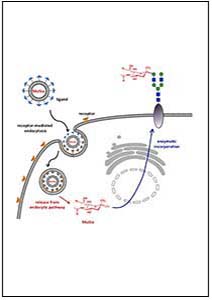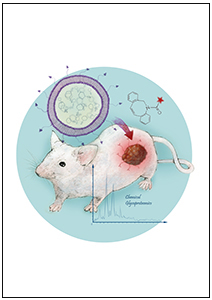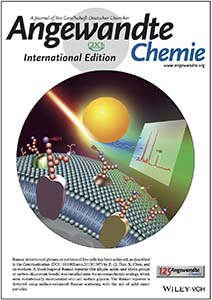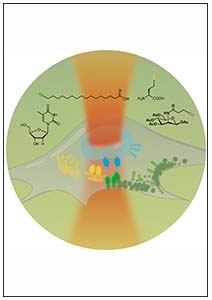The Chen Group studies glycosylation in protein quality control and immunology. We use the techniques of chemistry, biology, and nanoscience as tools to study and manipulate glycosylation in living systems. Another research direction in our lab focuses on elucidating the spatiotemporal regulation of cell signaling. Much of our research takes a highly interdisciplinary approach to tackle important questions related to human health and disease.
A. Chemical Glycobiology
We are developing new chemical tools to probe glycosylation. In vertebrates, more than half of the proteins are glycosylated. The glycans play a key role in regulating the properties and functions of the proteins to which they are attached. For example, sialic acid-containing glycoconjuates are involved in bacterial infection, viral invasion, and leukocyte homing. Aberrant glycosylation is implicated in disease (e.g., cancer) progression. Probing the dynamic changes of glycan biosynthesis and structures is, therefore, of great importance for augmenting our understanding of glycobiology and improving disease diagnosis and therapeutics. The metabolic glycan labeling technique has recently emerged as an appealing approach for detecting and imaging glycans on live cells and within living animals. We are applying this methodology to probe glycosylation in cardiovascular system and immune system. Furthermore, we are developing new tools to probe glycosylation in cell-specific and protein-specific manner.
B. Spatiotemporal Regulation of Cell Signaling
Our group is studying the spatiotemporal regulation of cell signaling, and develops nanotechnology-based targeted delivery system for human disease therapeutics. Living cells perceive vast amount of signals from their microenvironment via membrane receptors. The signals are transmitted through cellular signal transduction network into the center of the cell, nucleus, to generate sophisticated responses, such as cell growth, migration, and differentiation. Dysfunction of the spatiotemporal control of cell signaling has been implicated in numerous human diseases. Therefore, detailed mechanistic knowledge of the spatiotemporal regulation is essential for understanding mammalian cell biology and developing disease therapeutics. We use the techniques of chemistry, nanoscience, and biology as tools to study and manipulate complex cellular signaling processes in a specially and temporally controlled manner. The gained information will allow us to develop nanomedicine for targeted therapeutics.
All contents © xingchen Grp. All rights reserved. | The Chen Group, 202 ChengFu Road, Beijing 100871, China |Phone: +86-10-62756656 |Last update: Oct. 04, 2020




